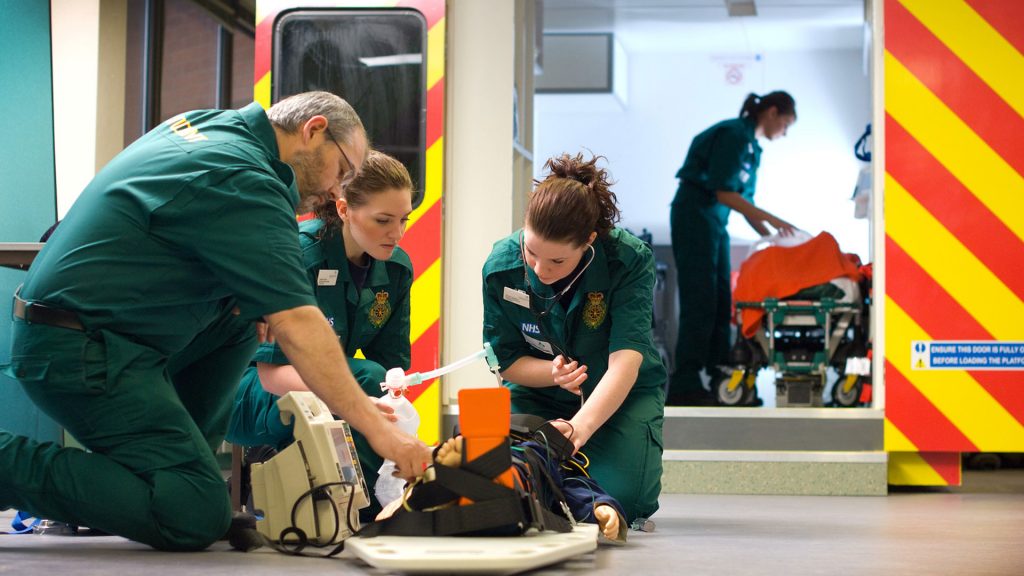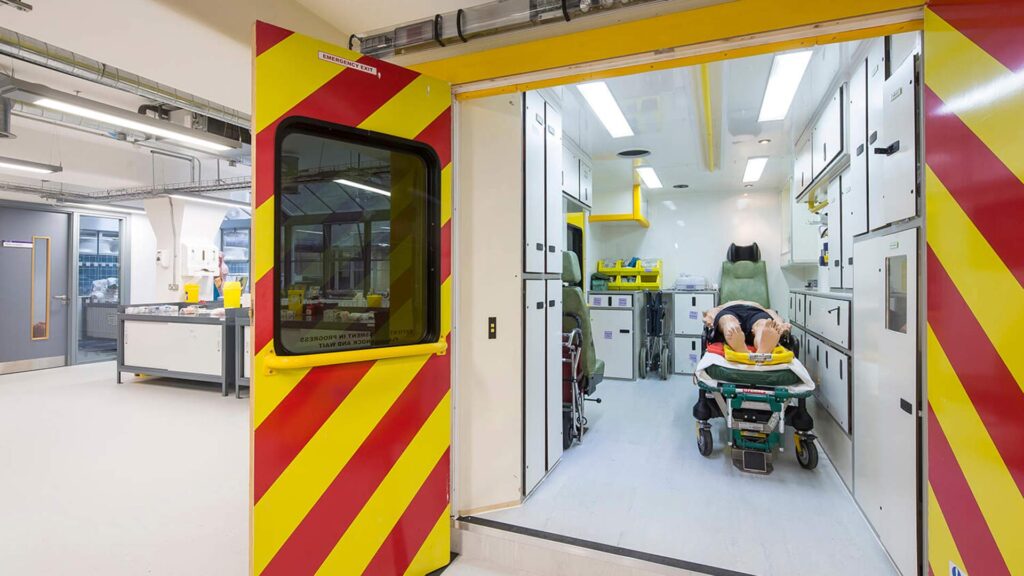BSc (Hons) Paramedic Practice course preparation
To help you feel prepared for your BSc (Hons) Paramedic Practice studies, we’ve put together a list of key department contacts and how to connect with them, where you can expect to learn and other tips on how to prepare for your transition to university. Read on to find out more.
Pre-course events
Before your course begins, you’re invited to join us for your welcome event. We are hosting an event at our Manchester campus. If you can, you should attend the event as it’s a great chance to meet your subject tutors, get to know others on your programme and get all your questions answered.

Important: Occupational Health
If you haven’t already been seen by the Occupational Health team, you’ll be allocated an Occupational Health (OH) appointment when your programme starts..
It’s a condition of entry to your programme that you’re cleared and immunised by OH and failure to meet this requirement could result in your place on the programme being jeopardised. And if you’re not fully cleared by OH, you won’t be able to access your maintenance loan via Student Finance England as you cannot fully enrol.
To ensure this process runs as smoothly as possible, we ask that you provide details of your immunisation record to the OH Team when you complete the questionnaire.
Please let us know if you’re unable to attend your allocated slot, preferably giving at least 24 hours notice. If you’re unable to give 24 hours notice or have an issue on the day of your appointment, please email [email protected] or call the team on 01695 657797. The OH and School team will try to provide a subsequent appointment, but it’s likely that it would be at the OH department base in Wigan and it’s your responsibility to ensure that you attend.
Please note that some of our placement settings may require you to be fully vaccinated against Covid-19 as a condition of placement. If you’re not vaccinated or are part way through vaccination, please let us know as soon as possible. This should be included on your immunisation record which will be enough to confirm your clearance.
We also recommend that you’re up to date with your MMR vaccines. You can find information about this on the NHS website.
Where your learning will take place:
As a Paramedic Practice student, your teaching will mainly be delivered at our St James’ campus in central Manchester. St James’ provides an extensive modern clinical simulation suite, which includes:
- mock operating theatre
- ambulance simulator
- clinical skills stations
A limited number of sessions will also take place in the Faculty of Heath, Social Care and Medicine at Edge Hill University. Here, you’ll focus on particular specialist subjects, such as counselling and maternity care.

Your Timetable
You will receive full timetable information from your department during Induction Week.
Ahead of this you can access the provisional course timetable on Student Calendar. You will need to select Courses from the drop-down menu, search for your course in the Resource(s) box and find the year one timetable from the list. Then just use the arrows to scroll forward to your course start date.
If you are going to be studying part-time with us, please look at the individual module timetables according to your planned curriculum.
Please note that all timetables on Student Calendar are subject to change. Check back regularly for updates.
Prepare for university
We know that you’re aware that you’ll be putting in hard work to study for your course when you arrive. But it’s not just academic skills that you’ll be using once you’re here. And there are a few skills that you might want to start to build now so that you’re a pro when it comes to the start of your studies in September.
- Time management – you may have conflicting deadlines as well as other personal activities to consider. So you’ll want to make sure that you manage your time well so that you can do everything you’d like to do. But, there may be times when you can’t do it all but managing your time well will help you to prioritise which activities are necessary and which you have to miss out on.
- Critical thinking – it’s important to show your true understanding of the topics you cover in lectures. And for some of this, you’ll need to critique the work you’re studying in a professional, academic manner. You may already be completing tasks like this in your current studies, so university will be a chance to enhance these skills. Don’t be afraid to share your opinions.
- Teamwork – some modules may require you to work with others on your course to complete tasks and discuss analytical findings.
- Independent work – in contrary to the above, it’s also important to be able to work independently. The majority of your work will need to be submitted individually so it’s important to take ownership of your learning. And if there is something that you don’t understand, make sure to ask your tutor.
- Self-motivation – you’ll be encouraged to work more independently which means that you won’t have a teacher that chases you up to make sure you’ve completed a piece of work on time. So it’s important that you hold yourself accountable and make the decision to put the work in.

To remind yourself of your modules, please visit your course page:
If you’d like to complete any preparatory reading, you can search for any reading related to your course on our online reading list.
Useful websites
- North West Ambulance Service NHS Trust
- Department of Health and Social Care
- National Institute for Health and Care Excellence (NICE)
- World Health Organisation
Before your studies begin, you should take a look at the Health and Care Professions Council (HCPC) website which will give you detailed information about the regulatory codes and standards expected of a Paramedic. You may also want to look at the College of Paramedics website, which will give you further information on curriculum guidance and the broader work of the college itself. And as a student paramedic, you’ll be eligible to become a member of the college.
Materials you may need:
It’s a good idea to wait until you start your course to buy any books or specific equipment as your tutor will be able to provide more details about what is essential. And our library may be able to provide you with reading materials. But there are a few things you may want to consider.
- Academic diary – a staple to help you with your time management as well as upcoming tasks in both your academic and personal life.
- Notepads and pens – some people prefer to do this digitally rather than on paper, whichever you prefer, make sure you have the resources to complete any notes you’d like to take. If you like to write on a physical notepad, consider an A5 size so that it’s easier to carry around.
And of course, anything else that you like to use for your academic studies, like highlighters, flashcards and folders.
Before you arrive, check out our UniSkills workshops. These sessions are designed to help you to build the academic skills that you’ll use throughout your time with us and beyond. Keep an eye on your emails for more information.
Making friends
We understand that sometimes it can feel daunting when you join somewhere new for the first time. But we’re here to reassure you that whatever you’re feeling is normal and perfectly ok. Once you arrive, you’ll be able to find out what activities and clubs/societies are available for you to get involved with. These are the perfect way to meet like-minded individuals who share your passions. Make sure to use our Student Life Portal to keep up to date with all the student events happening at Edge Hill.
